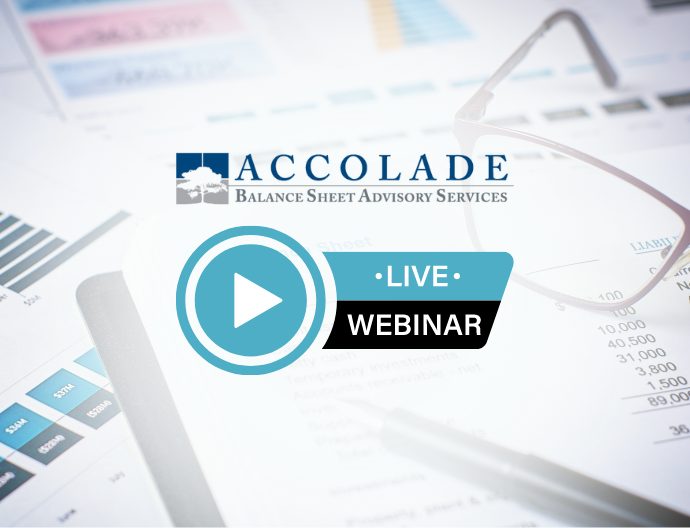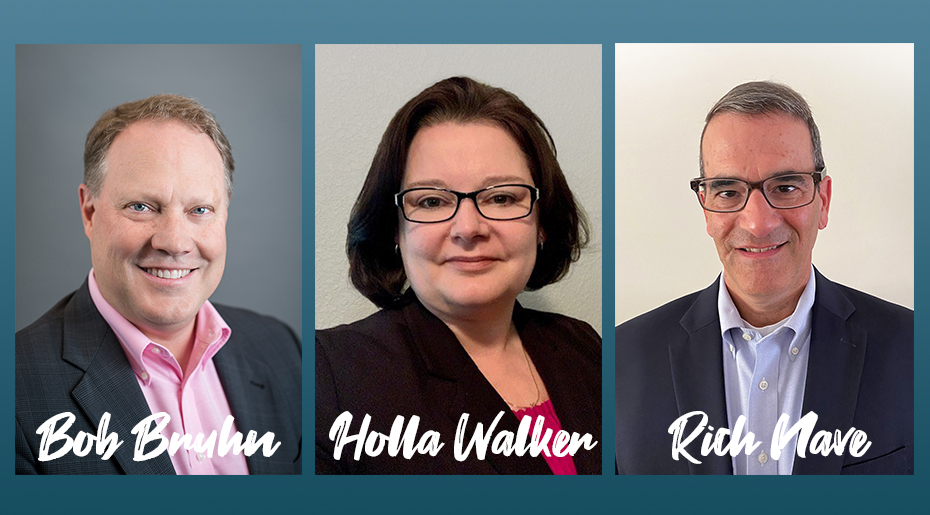
July 25th, 2022
November 29, 2021

By Alicia Disantis, Brand Manager at Aux
You may have heard that we launched a new Strategic CFO Consulting service over the summer, as a response to the increasingly-challenging task of finding, affording, and retaining experienced credit union accountants. And boy, have we seen a demand from credit unions over the past 5 months. Thankfully, our CFO Consultants are quick on their feet, mightily experienced, and can tackle the toughest strategic financial challenges without breaking a sweat (ok, maybe they do sweat occasionally.)
I sat down with former credit union CFOs and current Aux CFO Consultants Bob Bruhn, Holla Walker, and Rich Nave to learn a thing or two about current accounting challenges, trends, and thoughts on the credit union industry. Let’s dive in.

RN (Rich Nave): Margin squeeze and excess liquidity. You’ve got all this cash on the books that you are having a hard time deploying and making a good return on. Also, many credit unions are starting to look into other areas that they’re not typically involved in to deploy this excess liquidity, like FinTechs. And that could be good…but it could also be not so good if credit unions really don’t understand what they’re getting into. It’s important to just stay with your core competency, what you’re good at.
HW (Holla Walker): If we look at the current landscape right now with credit unions, especially smaller ones, they’re dealing with the low interest rate environment. Net interest margins are squeezed. You know, the pandemic has made the non-interest income just tank for them. And the last couple of months, we started to see a little bit of improvement, but it’s just not there. When budgeting for the credit unions I’m a consultant for, I don’t assume non-interest activity will ever go back to pre-pandemic levels.
When it comes to loans, the inventory of autos is not there for my credit union clients. A lot of these credit unions depend on buying loan participation pools, and there’s just not any available. Where else do you go if the interest income is not there and the member activity that drives the non-interest income, those fees and fines and interchange, isn’t there either? The Aux CFO Consultants are trying to provide solutions that credit unions can use. I ask, “How do we remain profitable in our current economic climate?” And I wish I had the answers; we just have to go line by line and see if there are things that we can do like promoting loan product sales, looking at card penetration, trying to get more interchange income. If you aggregate them together, they really could make a difference for profitability.
BB (Bob Bruhn): Technology and trying to compete with the Bank of Americas and Wells Fargos of the world, who have so much more money to throw at technology than most of the smaller credit unions. They struggle to provide the services that the larger financial institutions can provide and it causes challenges in remaining relevant.
BB: Staffing. So many credit unions are understaffed with the current economic world we live in and the unemployment the way it is, so there isn’t a lot of cross training. If somebody goes on vacation, tasks stop getting done. If somebody leaves, the credit union doesn’t know what that person was doing necessarily.
Another pitfall is when credit unions do not have all the data on their members and their activity because some of that data is in systems that are antiquated. If a third party has the data for loans or mortgages that the credit union doesn’t do in-house, they can’t access that data. Other financial institutions have more information to create the services and products that members would need.
HW: Right. I totally agree with the data issue. So many get all different types of reports from third party processors. PDFs, Word files, even – nothing is standardized. There’s no way to get that data into some sort of warehouse to get meaningful information out of it. Even when we’re doing call reports for clients, we’ll pull in reports from five or six different outside vendors to try to get the information we need. As a CFO consultant, our value-added is supposed to be getting meaningful information out of the data, but you find yourself using the time you should be spending making decisions on aggregating data instead.
RN: Leadership, and I don’t mean that in a negative connotation. I think the financial leaders – the CFOs and the VPs of Finance should be engaging with the accounting department so they understand what they do and how it fits into the bigger picture of the credit union. Accountants are good at what they do. They get things done. They are very precise and very accurate but need to view the bigger picture and see how it fits in. Credit union accountants have to focus on the service aspect of the accounting departments. Accounting departments serve the other employees of the credit union just like tellers serve members. I always try to get my people to think like that. You may not agree with what the lending folks want to do, but they are your customers and so you’ve got to work with them and come up with solutions.
AD: That’s fascinating. I’ve never heard of that before!
RN: Oh Boy. Oh, gosh. Let me think about that.
[The next day, Rich messages me and tells me he has his answer]: “I say ‘good times’ when I want to end a conversation. That’s not so bad, right?!
BB: Typically, some old show that I already know so that I don’t have to pay attention to it that much. I just have it on for noise in the background. “Friends,” or lately I’ve been watching “M.A.S.H” in the morning because it’s 40 years old and it’s kind of fun to see how people used to be. Right now, my wife’s making me watch “Dancing with the Stars.”
HW: I want to answer Bob’s question.
[Laughter]
HW: I so identify with Bob, though, that I also watch things that I’ve already watched before. But for me, it’s all Sci-Fi. I rewatch Battlestar Galactica, Star Trek, Expanse, and just anything Sci-Fi that I’ve already seen before. It’s an old friend.
BB: That’s a hard one, I don’t know that there’s that much that’s surprised me necessarily. Consolidations, perhaps, but I’m not sure that surprised me. It probably bothers me more than surprises me because I think there’s a place for smaller credit unions to still thrive and meet their members’ needs. But they’re all getting gobbled up. Now that I think of it, one thing that has surprised me is that credit union taxation hasn’t become larger. I was convinced 20 years ago when I started in the credit union industry that the bankers would get taxation to happen by now, and it has a little bit, but not very much.
HW: There hasn’t been a lot that’s surprised me, either. I don’t think anything in the accounting field should be surprising. We should all be unsurprising. One thing is that credit unions all have their own unique set of issues and problems, yet they still seem to be able to meet their mission. They are just so resilient and scrappy.
RN: The increase in regulations over the years. I think that’s been causing a lot more resources as opposed to what we should be doing – serving our members. I don’t see it getting any better. I don’t know why that surprised me. I just thought all along it would taper off. It kind of go in cycles or peaks, but it just keeps getting worse and worse.
HW: I’ve thought a lot about this, and I wish I had a better answer. I think that the key is going to be partnering, with either CUSOs or some other third parties that can help credit unions as technology evolves. They can’t do machine learning and AI from scratch, but they need those tools to be able to meet their members’ needs. Data analytics is how these institutions are going to be able to stay relevant with their membership. They have to know their members…that’s their niche. Knowing their members makes those smaller – like $100M and below – credit unions work. But to stay that way and to attract the newer generation, they’re going to need to have tools at their disposal to be able to target some of these people with special offers and services. And to be able to do that, they need to have a partner because they can’t do that in house.
RN: I think the future is bright as long as credit unions stay focused on who we are and who we’re here to serve. Credit unions do well to do good, meaning do well financially, so you can do good for our members. We’re not here to maximize profits. We’re not here to grow the bottom line. We’re not here to grow capital. We’re here to make a little bit of money to be financially healthy. We’re here to serve our members. I think if we stay focused on that, the future is going to be very bright. I’m worried about small credit unions, of course, because they have a hard time. It’s just very difficult for them with the environment, with the regulations and resources. And to Holla’s point, how can Aux, a CUSO, continue to help smaller credit unions?
BB: If you look at most credit unions, 5% of the members own 90% of the deposits. Those are typically older individuals. The credit union must figure out what made it attractive to that person so the whole family feels that same desire to stay with the credit union. I’m somewhat relieved, because two or three years ago if you asked me that question, I would have said FinTechs were going to take over. It seems like they’ve backed off a little bit because they don’t want to deal with all the regulation. But one thing credit unions have to do is get their data from their third parties and consolidate it in one system. Our best way to proceed is to have the information and systems available so that it’s not manual. Then, credit unions can spend the time where it is most efficient and not on tedious tasks.
RN: Parties…and exercise. (Laughing)
HW: I’m finishing up my MBA and I have a class where I’m learning about how machine learning can help in finance – distributed ledgers and stuff like that. I find that very interesting. In my spare time, I like to read old cookbooks. That’s interesting because I like to learn now, you know, you have a pig…what do you do with it?
BB: I like golf, and my grandfather on my mother’s side built a golf course here in Denver and ran it until early 1978. My mother always said, “You were born 10 years too late, Bob, because you could have been all over the country watching and playing golf with your grandfather.” So to go back 20 years before I was born to be with him and understand his love of golf. In addition, I would like to experience the founding of America. You know, how we became the country that we are today.
